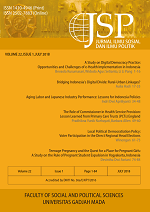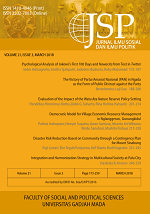Gaukang and White Coup: Dismantling of Traditional Power
Nila Sastrawati(1*)
(1) Departement of Criminal and Constitutional Law, Alauddin State Islamic University, Makassar.
(*) Corresponding Author
Abstract
This paper discusses the concept of power adhered to by the South Sulawesi community and explains the power struggle which had occurred both in the past and present. The South Sulawesi community’s conceptiontraditional power on power signifies a strong, transcendental relationship between themselves and supernatural powers, wherein all objects possessing certain peculiarities are inseparable from the stable and unchanging cosmic world. Thus, gaukang holds a significant position in the life of the South Sulawesi community, particularly pertaining to matters of power struggle. The waxing and waning of traditional power in South Sulawesi is determined by at least three factors: firstly, a change in power patterns with the emergence of new elites having a commoner background; secondly, incessant resistance to feudalistic rule; and lastly, the application of modern bureaucratic model. The general conclusion of this paper emphasizes the position of gaukang as a central point affecting the various power struggles that occurred throughout the history of the South Sulawesi community. The enactment of Regional Regulation (Perda) No. 5 year 2016 on the Organization of Gowa Regency Local Cultural and Customary Institution provides a peek at how bureaucratic power had dismantled traditional power in Gowa Regency, which included, consequently, the transfer of authority over the royal heirlooms or gaukang of the Gowa Kingdom.
Keywords
Full Text:
PDFReferences
Afandi, A. K. (2012). Konsep Kekuasan Michel Foucault. Teosofi: Jurnal Tasawuf dan Pemikiran Islam, 2(1), 131-149.
Ahimsa-Putra, H.S. (2007). Patron dan Klien di Sulawesi Selatan: Sebuah Kajian Fungsional- Struktural. Yogyakarta: Kepel Press.
Alvionitasari, R. (2016, September 30). Raja Gowa Mengadu ke Mabes Polri. Tempo. Retrieved July 12, 2017, form https://m. tempo.co/read/news/2016/09/30/078808658/ raja-gowa-mengadu-ke-mabes-polri.
Aminah, A. N. (2016, September 12). Raja Gowa: Perda Lembaga Adat tidak Sah. Republika. Retrieved from http://www.republika.co.id/ berita/nasional/daerah/16/09/12/ode0jf384- raja-gowa-perda-lembaga-adat-tidak-sah.
Anderson,B.R.O’G.(1990).Kua sa -Ka ta : Jelajah Budaya-Budaya Politik di Indonesia. Yogyakarta: Mata Bangsa.
Andrain, C. F. (1992). Kehidupan Politik dan Perubahan Sosial. Yogyakarta: Tiara Wacana.
Arfah, H. (2016, September 16). Pakar Hukum: Bupati Gowa Harus Jalankan Perda LAD. Tribunnews. Retrieved September 23, 2016, from http://makassar.tribunnews. com/2016/09/16/pakar-hukum-bupati- gowa-harus-jalankan-perda-lad.
Arsal, T., Wahyuni, E. S., Pandjaitan, N. K., & Hubeis , A . V. S. (2014). Politik Perkawinan dan Pola Pewarisan Kekuasaan di Konfederasi Ajatappareng, Sulawesi Selatan. Paramita, 24(1), 78-91.
Cipto, H. (2016, Seotember 13). Beredar Surat Petisi Penolakan Bupati Menjadi Raja Gowa. Kompas. Retrieved July 12, 2017, from http://regional.kompas.com/read/2016/09/13/13484781/beredar.surat.petisi.penolakan.bupati.menjadi.raja.gowa.
Cresw ell, J. W . (1994). Research Design Qualitantive & Quantitative Approaches. London: Sage.
Fadli, A. C. (2016, September 8). Bupati Gowa Dikukuhkan Sebagai Ketua Lembaga Adat Dareah. Rakyatku News. Retrieved from September 23, 2016, from http://news.rakyatku.com/read/19966/2016/09/08/bupati-gowa-dikukuhkan-sebagai-ketua-lembaga-adat-daerah.
Gunawan, S., & Isbodroini. (2005). Faham Kekuasaan Jawa: Pandangan Elit Kraton Surakarta dan Yogyakarta. Antropologi Indonesia, 29(2), 207-218.
Haq, A. (2016, September 12). Kisruh Kerajaan Gowa, Pasukan Kerajaan Kembali Bentrok dengan Satpol PP. Kompas. Retrieved July, 12, 2017, from http://nasional.kompas.com/read/2016/09/12/20244981/ kisruh.kerajaan. gowa.pasukan.kerajaan.kembali.bentrok. dengan.satpol.pp.
Hasan, M. N. (2012). Corak Budaya Birokrasi pada Masa Kerajaan, Kolonial Belanda hingga di Era Desentralisasi dalam Pelayanan Publik. Jurnal Hukum, 28(2), 1073-1087.
Hudjolly, & Marjaka. (2010). Gaukang dan Keraton: Strategi Kekuasaan. In Hudjolly, etc (Eds.) Nalar dan Tradisi. Yogyakarta: Re-Kreasi.
Klinken, v. G. (2010). Kembalinya Para Sultan: Pentas Gerakan Komunitarian dalam Politik Lokal. In J.S. Davidson & D. Henley, S. Moniaga (Eds.), Adat dalam Politik Indonesia. Jakarta: Yayasan Obor Indonesia & KITLV- Jakarta.
Murphy, J. B. (2011). Perspectives on Power. Journal of Political Power, 4(1), 87-103.
Nordholt, H. S. & Klinken, v. G. (2007). Introduction. In H. S. Nordholt & G. v. Klinken (Eds.), Politik Lokal di Indonesia (pp. 12). Jakarta: Yayasan Obor Indonesia & KITLV-Jakarta.
Nurmin, W. O. (2016, September 26). Breaking News: Demo Soal Kerajaan Gowa, Kantor DPRD Kebakaran. Tribunnews. Retrieved July 12, 2017,from http://makassar.tribunnews.com/2016/09/26/breaking- news-demo-soal-kerajaan- gowa- kantor- dprd-dibakar.
Pelras, C. (2006). Manusia Bugis. Jakarta: Nalar & Forum Jakarta-Paris, EFEO.
Poelinggomang, E. P. L. (2004). Perubahan Politik dan Hubungan Kekuasaan Makassar 1906-1942. Yogyakarta: Ombak.
Rochayati, S. (2010). Jatuhnya Benteng Ujung Pandang Makassar Pada Belanda (VOC). Bachelor Thesis (Unpublish). Surakarta: Fakultas Keguruan dan Ilmu Pendidikan Universitas Sebelas Maret.
Yasen, S. (2008). Maestro 27 Karaeng Bugis- Makassar. Makassar: Pustaka Refleksi.
Article Metrics
Refbacks
- There are currently no refbacks.
Copyright (c) 2017 Jurnal Ilmu Sosial dan Ilmu Politik

This work is licensed under a Creative Commons Attribution-NonCommercial-NoDerivatives 4.0 International License.






















